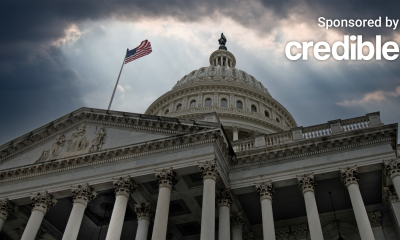Investing
Why America is a Nation of Growing Inequality and Diminishing Returns

Entrepreneur
After nearly two decades of growth following the 2008 financial crisis, it appears America is reluctantly entering a highly-necessary economic correction. Rising compensation in leading industries like financial services and tech has finally stalled, luxury goods prices are falling off a cliff, and the outlook of the average American hasn’t been this bleak in quite some time, which comes as little surprise.
More than 48% of Americans earning $100,000 or more live paycheck to paycheck, while that figure still sits at a staggering 36% for $200,000 income earners. The times are tough.
Millennials and young adults are disproportionately affected. Despite being more educated and skilled than previous generations, more than 75% of millennials live paycheck to paycheck. Younger generations are also less likely to own property or start a family due to rising interest rates and inflation.
Sure, help’s on the way given Jerome Powell’s recent remarks at Jackson Hole; however, it’s unlikely that loosening monetary policy will stimulate the same opportunities for wealth creation that boomers experienced after the financial crisis. We are reaping the consequences of the shortsighted desire to unsustainably inflate markets. This has created the mess we see today.
Because interest rates have been low for so long, most homeowners are likely sitting on substantial wealth financed at rates they may never see again. For them, the past few years have been a few seconds of turbulence on a flight to financial freedom and prosperity. Meanwhile, young people are confused about what to do next. To put it bluntly, boomers aren’t selling their homes, the dollar is losing value as we speak, and America is slowly becoming the land of diminishing returns, a far cry from opportunity. In essence, this is the birth of America’s dual-economy.
Related: Inflation’s Next Victim Will Be Your Freedom
Why “six figures” is no longer the flex it used to be
Working up the corporate ladder into upper-level management represented the pinnacle of success for as long as the millennial-aged adult can remember. It epitomized the privileged yet growing “successful” phenotype that originated around America’s peak. The millennials reading this know all too well the times I’m speaking of – peak nostalgia.
In what feels like a time more short-lived than the relevancy of an early 2000s MTV reality show, $100,000 suddenly became not that much money. Don’t get me wrong: $100,000 is still a lot of money. Truthfully speaking, $100,000 is enough to provide a modest life for a growing family in more than 75% of American cities, give or take.
Parallel to the insatiable growth experienced by different industries, American culture has developed a similar ambition for never ending, unsustainable growth. Globalization and the proliferation of social networking broadened the horizons of what luxury looked like for even the well-traveled, privileged elite. This coupled with capitalistic greed created a hamster wheel of inflated expectations. The goalposts on what is considered to be “success” have been moved dramatically. Unfortunately for all of us, the definition of success appears to be far greater than $100,000.
Related: Don’t Blindly Follow the Herd — 5 Reasons Why Entrepreneurs Must Chart Their Own Course
Capitalism… Markets… Regulation… and Incentives
Millennials witnessed what felt like 90% of America’s growth unfold over the course of our lifetimes. We saw the birth and adolescence of the personal computer and the iPhone. We saw the introduction of entirely new technologies like blockchain, AI, distributed marketplaces, gig economy ecosystems, and more. Can you imagine telling your childhood self that you’d be able to pick up a device half the size of a Game Boy and order virtually anything to your door within minutes? Of course not.
What came of this acceleration of innovation was the creation of millions of jobs uniquely suited for the tech-savvy millennials entering the workforce. You could liken the endless cushy tech jobs appearing overnight to the California Gold Rush. America created the most ambitious yet materialistic generation of twenty and thirty-somethings we’ve possibly ever seen. All of them had money in their pockets and were looking for a good time. Corporations saw a perfect opportunity to monetize this new segment of the American population, but regulators struggled to keep up.
Related: Breaking the Bank: America’s Multi-Trillion Dollar Banking Problem
Sure, some young people may need to take personal responsibility for their bank balances being too tight at the end of the month. Not everybody can or should buy a $50,000 depreciating asset, nor should it be commonplace to max out your credit card to finance that summer trip to Europe. But most people aren’t living their lives that way. The government is responsible for ensuring that the staples of life, like home and care ownership, remain within reach and are life goals worth working towards. In many parts of the world, this is not a controversial opinion. It is similar to how pressure from whistleblowers and the U.S. government has forced social media companies to take steps to protect the safety and well-being of their users.
Americans’ expectations have changed, social media platforms have grown, and so have Americans’ expectations of how to protect their users’ safety and well-being. As these platforms grow, expectations of social media show many Americans that it’s similar to whistleblowers and the government. Media companies have had to take steps to ensure that their platforms protect the safety and well-being of their users as these platforms continue to grow.
From price gouging fueled by Black Swan global emergencies to Wall Street’s unimpeded access to the supply of homes, the whiplash and disillusionment that younger generations face has underscored the wealth gap that’s inevitably set to bifurcate the lived American experience.
Conclusion
In the context of human civilization, rule #1 has always been: don’t die. Humanity, in essence, is about survival. Central to our survival are love, prosperity, friendship, and the countless characteristics that separate us from the other creatures on Earth. Generations come and go, but the human experience is constant.
Today, America is at its most apathetic point in history. Don’t get me wrong, America’s still great. For the foreseeable future, it appears to be one of, if not the best, places to live. But that’s down to the pride of its inhabitants. It’s the expectation that future generations must bear the torch and push America to new heights.
Declining birth rates should be viewed as a proxy of what the survivalist spirit of America will be in generations to come. Our lineage is what motivates us to keep going. The fact that society has unraveled to the point where future generations question whether they want to bear that honor and if it’s even responsible for doing so is worrying. Meanwhile, the more fortunate side of the economy eagerly awaits the Federal Reserve’s tardy rate reductions so that the next leg of economic growth they’re financially exposed to can add to this already staggering wealth divide.
It’s profoundly perplexing that America does not realize that wanting everything will ultimately cost us everything. Now more than ever, America must rescue itself. If not, the next 20 years are likely to be even more challenging than the last.
Read the full article here

-

 Side Hustles6 days ago
Side Hustles6 days agoWhy the Best CEOs Think Like Anthropologists
-

 Side Hustles4 days ago
Side Hustles4 days agoThis User-Friendly H&R Block Software Package is Only $40, While Supplies Last
-

 Investing4 days ago
Investing4 days agoTikTok faces US ban deadline as users brace for fallout By Reuters
-

 Passive Income3 days ago
Passive Income3 days agoTrain for a New Tech Career in 2025 With This $25 Course Bundle
-

 Personal Finance5 days ago
Personal Finance5 days agoDecember inflation clouds Fed's outlook on interest rate cuts
-

 Personal Finance6 days ago
Personal Finance6 days agoCalifornia's homeowners insurance industry faces rough road ahead as wildfires continue
-

 Investing6 days ago
Investing6 days agoWhy Not Owning Bitcoin is Making You Poor
-

 Make Money6 days ago
Make Money6 days agoDon’t Settle: 5 Game-Changing Moves to Maximize Your Financial Advisor’s Impact


















